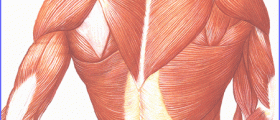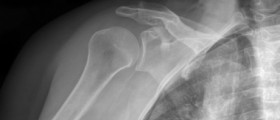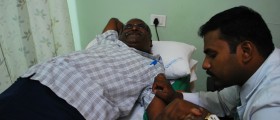
Pain in joints and muscles
This kind of pain occurs mostly because of the inflammation of joints and muscles. It seriously affects the lifestyle and level of activity of an individual who suffers from it. Typically, affected muscles are found in the region of the hips, knees and shoulders, but there are no rules and all muscles in the body may be affected. If the pain in the joints and muscles is acute, then such symptoms can resemble those of viral flu, when you feel broken and beaten. Sometimes, the symptoms remind of symptoms of arthritis, namely, there is an aching pain in the joints, which become swollen and tender. Some people are not so affected by joint pain as by muscle pain, insomuch that they experience a loss of strength.
People who suffer from muscle and joint pain are advised to deal with such condition with the proper mix of rest and exercise, as they should avoid to put any excess stress on and worsen the condition of affected muscles and joints.
Causes of pain in joints and muscles
The usual cause of joint and muscle pain is systemic lupus erythematosus or SLE. In some cases, joint and muscle pains precede SLE. Some people affected by SLE feel joint and muscle pain even when they are resting. Similar pain is caused by arthritis or muscle injury, so diagnosis should be determined by a doctor.
Thyroid disease and muscle and joint pain
Both forms of problems with the thyroid gland, hypothyroidism and hyperthyroidism, are known to cause a number of symptoms related to muscles or joints, referred to as myopathies, that is, diseases that affect skeletal muscles (those muscles that are connected to bones, such as those in your limbs). Myopathies typically affect proximal muscles. These are the muscles that are close to the center of the body, such as muscles in the thigh and in the shoulders. Reason for myopathic pain and weakness is in white blood cells attacking parts of the muscles in question, or in accumulation of some substances in those muscles.
Hypothyroidism symptoms that affect muscles are swelling of the muscles or swelling that is pressing on the nerves. This causes weakness and pain in the muscles, including cramps, and stiffness, general joint pain, aches and stiffness, and inflammation of tendons in the arms and legs.
Muscle pain is not typical for hyperthyroidism, but muscle weakness and fatigue are common. People affected by hyperthyroidism may lose muscle tone and strength, which leads to symptoms such as difficult climbing up stairs or holding or gripping of objects with hands, or difficulty to raise arms above the head.















-Symptoms,-Diagnosis,-Treatment_f_280x120.jpg)

Your thoughts on this
Loading...